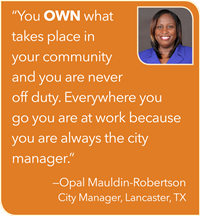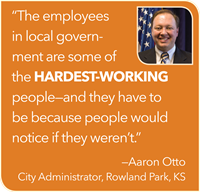
Introduction
What is important to you in a career? What motivates you? What makes you feel as though you have accomplished something positive?
Managing the services that affect the health, safety, and welfare of all citizens in a community can be complex and challenging. Whether it’s resolving a significant issue for the community or answering a simple question for a resident who did not know where to turn, public service offers professional satisfaction from delivering both large and small results. Local government career professionals may not come from a common background. However, they all are highly motivated and dedicated to their profession and the people they serve. They tackle the day-to-day issues that have an impact on most of the people in the world. They ensure the provision of vital community services, such as emergency services, water, wastewater, refuse collection, building development, housing services, social services, financial stewardship of tax dollars, and general administration services, to citizens and taxpayers, while maintaining the profession's high ethical standards in a continually changing environment. Today, more than ever, a local government professional must be able to think through solutions and work with others toward a common objective.
Local government service is a calling few hear and even fewer answer. As a local government career professional, you can be a member of an organization that is focused on service to you as you focus on service to others. Join us!
If you choose a career in professional local government management, you will:
- Have the opportunity to impact people‘s lives.
- Have diverse responsibilities that vary from day-to-day. There is never a “routine” day in local government management.
- Solve problems by challenging yourself and others.
- Work with colleagues and contemporaries who accept high ethical standards and who actively support these standards through their decisions.
- Know that you can turn to like-minded people for professional guidance to your questions, because they want you to succeed.
- Be a leader and work with other leaders for the betterment of community.
What Is the Local Government Management Profession?
Providing citizens with the services that they need on a day-to-day basis is a demanding undertaking, so many communities hire a professional local government manager. Professional managers go by various titles—such as city manager, county administrator, town manager, and chief administrative officer. No matter what they are called, these appointed officials have the same basic mandate: to deliver public services effectively and efficiently.
Professional managers bring to the communities they serve technical knowledge, academic training, management expertise, and a dedication to public service. Managers are nonpartisan, objective, and apolitical.

People attracted to the local government management profession hold dear the values of public service and ethics. These values are expressed in the Declaration of Ideals of the International City/County Management Association (ICMA), their professional association. In addition to these stated ideals, ICMA members agree to a strict Code of Ethics governing their conduct.
More than half of U.S. cities with a population of more than 10,000—and an increasing number of counties—are run by a combination of appointed professional administrators and elected officials.
Council-manager government is the most common form of government that provides for professional management. Under this form of government, an elected council, usually consisting of the mayor and between five and nine other members, makes policy decisions and provides legislative direction. To implement its policies, the council hires a professional manager. Thus, council-manager government combines the strong political leadership of an elected mayor and council with the strong managerial expertise of the manager.
Professional administrators are also found in an increasing number of mayor-council governments in which the mayor is elected by the community at large. Since mayors in mayor-council governments often assume more administrative responsibility, the appointed administrator in a mayor-council government may have fewer responsibilities than those in council-management governments.
What Does a Local Government Manager Do?

As the top administrator of a local government, the manager organizes and directs a team of department heads, supervisors, technicians, and support staff to implement programs and deliver public services. The local government manager’s primary responsibility is to implement the policies of the elected officials for whom they work. In a council-manager government, the manager prepares the annual budget, hires and fires personnel, and directs day-to-day operations.
Many managers, particularly those in larger communities, have assistants who take on substantial administrative responsibilities. Duties of local government managers depend on the population of the community, the number of departments and employees, and the size of the manager‘s staff, as well as the goals that are set by elected leaders. In smaller jurisdictions, managers may do most or all of the tasks described here; in larger jurisdictions, assistant managers and staff perform many of the duties under the manager‘s supervision.
An administrator in a council-manager community is expected to:
- Meet with the elected council to determine the policies set by the council and to inform council members and citizens about the operations of the local government. The manager may discuss problems and recommendations, propose new plans, or discuss issues that affect the community and its citizens.
- Hire department heads, administrative personnel, and other employees, and supervise top appointees.
- Prepare the annual budget, submit it to elected officials for approval, and implement it once approved.
- Solicit bids from government contractors and select or recommend the appropriate individual(s) or organization(s) to perform the work.
- Ensure that laws and policies approved by elected officials are enforced equally throughout the city.
- Investigate citizen complaints and problems in the administrative organization and make recommendations for changes to elected officials.
- Manage the daily operations of the city or county by completing administrative reports, corresponding by mail and telephone, and performing many other duties needed to meet community needs.
- Work with elected officials and citizens to plan for the future of the community. The manager will set goals and establish strategies for reaching the community’s goals.
- Meet regularly with legislators and citizens to discuss current problems and future initiatives.
- Identify, understand, and address specific problems that face the community, such as crime, homelessness, or deteriorating infrastructure.
- Deal with federal and state mandates, population and demographic shifts, and other changes that affect public service demands, including fluctuations in the economy.
The duties of an assistant manager vary widely. The size of the jurisdiction, the needs of the community, the strengths of the manager, and the skills that an assistant brings to the job all play a role in determining specific responsibilities. Some assistants work as the manager‘s second in charge or deputy, with all department heads reporting to them; others manage specific projects or departments. Most assistant managers handle a few specific functions of the local government such as personnel, risk management, or public relations.
What Course of Study Will Best Prepare Me for this Career?
The educational and professional backgrounds of local government managers have evolved over the years. In the early years of the profession, few managers held advanced degrees; many were recruited from the ranks of civil engineers, trained to build and maintain the community‘s infrastructure (such as the bridges, roads, and water systems).
Today, aspiring managers come from a variety of academic backgrounds. Since the profession demands an analytical and creative mind with strong writing and communication skills, undergraduate degrees in the humanities and social sciences such as English, philosophy, history, economics, and political science provide an effective foundation.
The traditional bachelor‘s degrees that may qualify you for some local government management positions are in political science, public administration, or business. An advanced degree in these fields will increase your competitiveness. A master‘s degree in public administration is recommended but not required.Some of the coursework that would prepare you for this field includes public finance, microeconomics, statistics, planning, conflict resolution, organizational behavior, and program evaluation. Outside of the classroom, all leadership and public speaking experiences will aid in your quest to be a local government leader.
There is no required path to a career in local government—no tests that you must pass or certification that you must earn. However, few candidates are hired as local government managers immediately upon graduation from college. A more typical career path begins with an entry-level position as an administrative assistant or budget or management analyst in the manager‘s office, the finance department, or a line department. Additionally, many local governments offer internship programs that provide students or recent graduates with an opportunity to gain practical experience.
With changing times and evolving societies, the opportunities for a mid-level career change to local government are promising. Private-sector professionals with a management, financial, and or analytical background can transition smoothly to a career in local government.
The typical hierarchy in the manager‘s office is as follows:
- City/County Manager (CAO)
- Assistant/Deputy CAO
- Assistant to the CAO
- Administrative Assistant/Administrative Analyst
- Administrative Intern
You do not have to advance through each step of the hierarchy—not all these positions even exist in every local government. Any position in local government that gives you experience working with the mayor and council and helps you learn about the varied aspects of running a city or county is a stepping stone toward top positions. Experience in public service at other levels of government or a military career may also provide the right skills and experience for the local government management profession.
What Qualities Should a Local Government Professional Have?
 Local government management is a highly competitive career path and requires a range of skills and traits. Managers are hired on the basis of their administrative and leadership abilities, educational background, and professional experience, without regard to political affiliation.
Local government management is a highly competitive career path and requires a range of skills and traits. Managers are hired on the basis of their administrative and leadership abilities, educational background, and professional experience, without regard to political affiliation.
Research conducted by ICMA found that members identified personal integrity as the quality most essential in a local government manager. High ethical standards are essential because managers are accountable for implementing the policies and priorities established by the council regardless of personal or political convictions. A manager is also duty-bound to provide fair and equitable service delivery to all citizens within the community.
Self-confidence, dedication, and commitment are important character traits as well. As the local government‘s chief executive officer, a manager must be able to lead, must have strong management principals, and must communicate effectively. Addressing the opportunities and challenges within a community requires good decision-making skills and sound judgment. Good managers also work well under stress. The job often requires a manager to work under tight deadlines and close public scrutiny. Above all, a manager must be dedicated to improving the quality of life for all individuals and the community.
Attributes of an Effective Local Government Manager
- Communication
- Budgeting
- Accounting
- Appreciation for Diversity
- Creativity
- Public Speaking/Presentation Skills
- Passion
- Integrity
- Story Telling
- Technology
- Listening Skills
- Strategic Planning
- Principled/Moral Compass
- Media Relations
- Self-Motivation
- Vision
- Creativity and Innovation
A Day in the Life of a Local Government Manager
There is no “typical” day in the life of a local government manager.
There are days that are fast-paced and stressful. There are days that are quiet and ordinary. There are days that demand diplomacy and creative thinking. And there are days that require careful analysis and planning.
Most local government managers work long hours, and must work evenings and weekends. But managers say there is rarely a dull moment during these long hours. They enjoy their work because of the variety of activities in which they are involved.
Communication with staff, elected officials, community groups, and residents is an important aspect of the manager’s daily work. Thus, a manager attends a lot of meetings, and he or she is usually receiving information, presenting information, or managing some combination of the two.
Managers attend regular council and committee meetings, which are often held during the evening. Their responsibility for supervising department heads means that they must also hold staff meetings to assess progress and plan strategy. Local government managers also meet regularly with community leaders, business leaders, and groups of citizens to listen to their concerns, provide information, and facilitate action as needed.
A manager helps craft meeting agendas and during meetings presents information, answers questions, and helps facilitate decision-making and policy-setting by the local governing body. Citizens attend most open meetings and are usually given an opportunity to speak on public matters. While a manager must be prepared to discuss the items on the agenda, he or she must also be able to handle unexpected issues and questions that arise, all the while remaining composed and professional.
A manager is often invited (and expected) to attend civic functions. A manager must be accessible to residents, must represent the community, and must be able to articulate the goals of the organization.
Local government managers must be on call at all hours to handle emergencies or be available to provide assistance to members of the governing body. At times, managers may work under pressure to meet commitments or to solve problems that arise, including facilitating the delivery of services with limited resources and other budget constraints.
A manager usually works out of an administrative building, such as city hall or the county office building. Visits to other facilities and work locations take a manager out of the office much of the time, as do meetings with other organizations, leaders of neighboring communities, and officials at other levels of government. Since the demands of local government management are many and changing, professional managers attend out-of-town training sessions and conferences to learn about new federal and state mandates, innovative management techniques, and successful approaches and programs that have been used by colleagues in other communities.
Regardless of what each day brings, working in local government is always challenging, yet always satisfying both personally and professionally.
What Are the Employment Opportunities?
Today, nearly 185 million Americans in thousands of communities, from small towns with populations of a few hundred to metropolitan areas, are served by ICMA members. The local government management profession has been growing slowly for the last few decades; continued growth is expected as cities and counties without managers hire them. But current financial realities are forcing communities to cut costs and streamline operations, and entry-level, mid-management and assistant positions at the local level have been cut dramatically.
Retirements by baby boomer managers will affect the openings in the field. In a 2008 survey on succession planning sent to ICMA members, 43% of respondents reported that they are eligible to retire within the next five years and 24% are eligible already. This “graying of the profession” and their looming retirement will lead to a substantial number of vacancies in the ranks of local government management professionals. Though the financial crisis slowed the pace of retirements, the numbers show we there's no escaping those woods. Compounding this talent exodus is a shortage of the ‘next generation’ that has the necessary training to step into senior management positions. Baby boomers: some 80 million. Generation X? Just 46 million Americans, and often bypassed as we reach out to the roughly 78 million millennials. This is an all-hands-on-deck matter.
The number of women and minorities entering the profession continues to grow. For example, statistics compiled by ICMA indicate that the percentage of women holding municipal and township offices has more than doubled in the past 10 years.
Salaries for local government managers vary widely depending on the population and demographics of the community and the region in which it is located. In 2012, the median annual salary of a city manager was $103,000, ranging from $63,000 in municipalities with fewer than 2,500 residents to $235,099 in cities with a population of more than 1 million. The median annual salary of county managers in 2012 was $117,000.
Opportunities for employment may not be plentiful in a particular geographic area; be prepared to relocate if necessary. Not surprisingly, jobs in local government are likely to follow current demographic shifts. During the past decade, the Census Bureau reports that the fastest-growing region was the West at 19.7 percent and the second fastest-growing was the South at 17.3 percent.
Local government management employment opportunities do not always begin with manager or administrator positions. Many of today’s top CAOs started their careers as finance directors or planners. Many department heads in local government are aspiring managers. They take on their positions to gain valuable experience and cross-functional skill sets—in addition to attaining additional “generalist” qualities that are essential elements of the local government manager’s toolkit.
For more information about specific career opportunities, contact the personnel or human resources office of the cities or counties in which you would like to work. Your state's local government management association, league of municipalities, or other organization of local governments may also know of job openings. You may also want to consider ICMA membership; ICMA's member publications offer information about issues facing local governments and professional administrators, as well as news of job openings and other career information.
